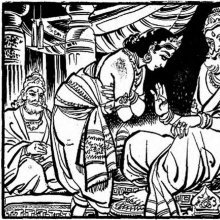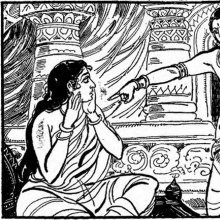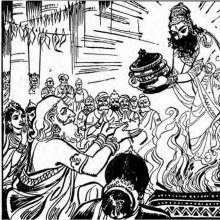Wise men, Wise man: 2 definitions
Introduction:
Wise men means something in Hinduism, Sanskrit. If you want to know the exact meaning, history, etymology or English translation of this term then check out the descriptions on this page. Add your comment or reference to a book if you want to contribute to this summary article.
Images (photo gallery)
In Hinduism
Yoga (school of philosophy)
Source: ORA: Amanaska (king of all yogas): A Critical Edition and Annotated Translation by Jason BirchWise Men are denoted by the Sanskrit term Manīṣin, according to the Śivayogadīpikā by Sadāśivayogīśvara: a text dealing with Śaivism and Haṭhayoga in two hundred and eighty-nine verses.—Accordingly, while discussing the difference between Rājayoga and Śaivayoga: “Truly, Śiva’s yoga is not identical to Rājayoga. [This] is so said by worshippers of Śiva [and] it is apparent to the [higher faculty of] discernment. The difference between the two is taught to those devoted to Śiva. Therefore, the yoga of Śiva is understood only by [those] wise men (manīṣin) . [...]”.

Yoga is originally considered a branch of Hindu philosophy (astika), but both ancient and modern Yoga combine the physical, mental and spiritual. Yoga teaches various physical techniques also known as āsanas (postures), used for various purposes (eg., meditation, contemplation, relaxation).
Shaktism (Shakta philosophy)
Source: ORA: Amanaska (king of all yogas): (shaktism)Wise Men are denoted by the Sanskrit term Dhīmat, according to the 17th century Kaulagajamardana (“crushing the Kaula elephant”) authored by Kāśīnātha or Kṛṣṇānandācala.—Accordingly, [as Īśvara said to Pārvatī]: “Listen, O Pārvatī, I shall give a critique of the Pāṣaṇḍas. Knowing this, a wise man (dhīmat) [manujo dhīmān] is not defeated by them. Those devoted to fake observances; those who rebuke the religion of the Vedas; those who have fallen from caste and religious duties; those who have erred and think themselves learned, they are [all] called Pāṣaṇḍas [because] they act contrary to [true] religion. They fall into a terrifying hell until the end of the world. [...]”

Shakta (शाक्त, śākta) or Shaktism (śāktism) represents a tradition of Hinduism where the Goddess (Devi) is revered and worshipped. Shakta literature includes a range of scriptures, including various Agamas and Tantras, although its roots may be traced back to the Vedas.
See also (Relevant definitions)
Full-text (+475): Vaida, Sudhi, Budhajana, Budha, Kavishasta, Vidvajjana, Sadetina Shahane, Pandita, Addhati, Prajnakatha, Budhana, Shishtadishta, Atmavid, Mikkor, Sumati, Viddasu, Mahamati, Matutha, Daishonin, Vinnu.
Relevant text
Search found 239 books and stories containing Wise men, Wise man; (plurals include: Wise mens, Wise mans). You can also click to the full overview containing English textual excerpts. Below are direct links for the most relevant articles:
Sutrakritanga (English translation) (by Hermann Jacobi)
The Jataka tales [English], Volume 1-6 (by Robert Chalmers)
Jataka 473: Mittāmitta-jātaka < [Volume 4]
Jataka 396: Kukku-jātaka < [Volume 3]
Jataka 317: Matarodana-jātaka < [Volume 3]
Yoga Vasistha [English], Volume 1-4 (by Vihari-Lala Mitra)
Chapter XLVII - The first step towards liberation < [Book VII - Nirvana prakarana part 2 (nirvana prakarana)]
Chapter XLV - Continuation of the story of the deerlike mind < [Book VII - Nirvana prakarana part 2 (nirvana prakarana)]
Chapter XII - Reasoning on the doubts of the living liberation < [Book VI - Nirvana prakarana part 1 (nirvana prakarana)]
Brahma Sutras (Ramanuja) (by George Thibaut)
Sutra 4.2.19 < [Fourth Adhyaya, Second Pada]
Sutra 4.4.22 < [Fourth Adhyaya, Fourth Pada]
Sutra 4.3.1 < [Fourth Adhyaya, Third Pada]
Brahma Sutras (Nimbarka commentary) (by Roma Bose)
Brahma-Sūtra 3.2.26 < [Adhikaraṇa 6 - Sūtras 22-30]
Brahma-Sūtra 1.4.25 < [Adhikaraṇa 7 - Sūtras 23-27]
Brahma-Sūtra 1.4.6 < [Adhikaraṇa 1 - Sūtras 1-7]
Samkhya thoughts in the Mahabharata (by Shini M.V.)
Knowledge and Ignorance < [Chapter 3 - The Philosophical Tenets in the Śānti-parva]
Jīvanmukta (Jeevan Mukta)—Liberated Souls < [Chapter 4 - Sāṃkhya thoughts in the Śānti-parva of Mahābhārata]
The philosophy of Rebirth < [Chapter 4 - Sāṃkhya thoughts in the Śānti-parva of Mahābhārata]


